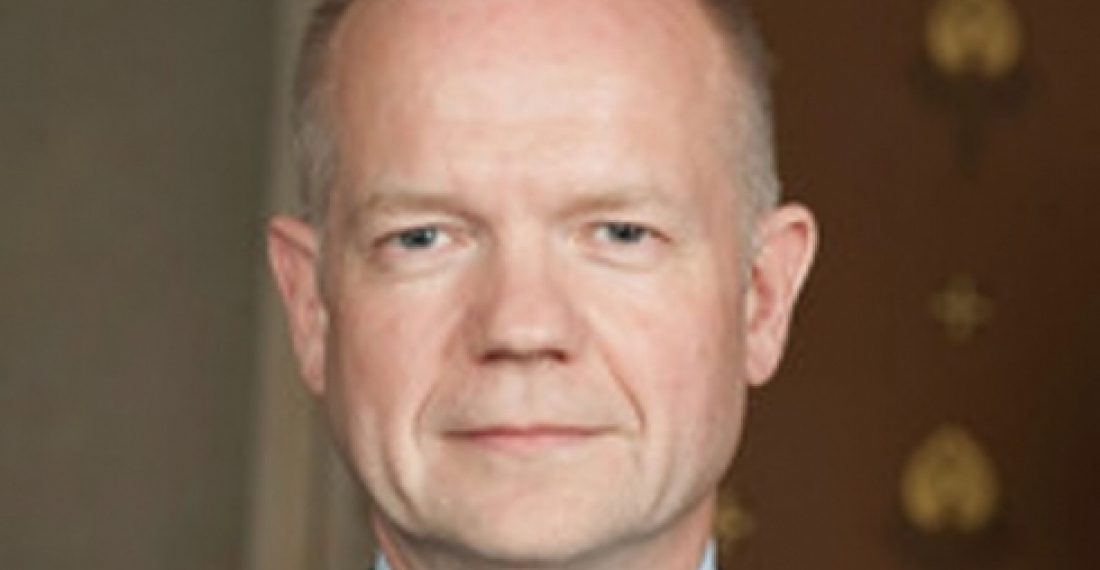The British Foreign Secretary, William Hague, has highlighted the seriousness of the current situation following the Russian annexation of Crimea, in an article in the London newspaper Daily Telegraph on 22 March. William Hague wrote:
This week European nations adopted unprecedented sanctions on Russia. These are not designed to punish the Russian people. They are a message and a warning to Russia's leaders.
We have not embarked on this course lightly. For twenty years Britain and our allies in Europe and Nato have gradually built a normal relationship with Russia. Russia joined the G8 and the World Trade Organisation, we created the Nato-Russia Council, and we have worked together on the United Nations Security Council from Yemen to Somalia. We have all gained from this cooperation.
But Russia's actions in Ukraine hark back to a wholly different era. The illegal annexation of Crimea is an outrageous land grab, and the referendum that preceded it was a mockery of democracy. Russia has invaded a fellow European nation, and used force to change its borders.
This is the most serious risk to European security we have seen so far in the 21st century. Vital principles are at stake, including the territorial integrity of European nations and the right of democratic countries to choose their own future.
All nations, including Russia, depend on a rules-based international system. For those rules to remain credible there must be costs attached to breaking international agreements. If we do not defend these principles in Ukraine, they will be threatened elsewhere in Europe and the world.
There is a pattern emerging of Russia taking advantage of frozen conflicts from Transnistria to South Ossetia, and seeking to impair the ability of countries to chart an independent future. And with thousands of Russian troops still massed on Ukraine's borders, there is a grave risk of the Ukraine crisis deepening.
That is why the EU, the United States and our allies have imposed sanctions. The European Commission are working now on more far-reaching economic measures that will be imposed if Russia takes further steps to undermine Ukraine.
We want Russia to enter into direct talks with Ukraine, and to work with other nations to resolve this dispute peacefully. We have never given up on diplomacy or sought a path of permanent confrontation with Russia. But nor should European nations run scared before bullying behaviour.
Despite our preference and our work to improve relations with Russia this means, sadly, that we and our allies must be prepared to contemplate a new state of relations with Russia that is very different to the last 20 years. This would involve Russia being outside some international organisations, facing lasting restrictions on military cooperation and arms sales, and having less influence over the rest of Europe.
Some in Russia may think that their actions in Crimea will produce short-term pain in the form of limited sanctions, after which matters will return to the status quo ante. But in fact, the Russian people stand to lose a great deal over time - in Ukraine, in Europe, and internationally.
Russia's actions have done immense damage to its reputation. At the United Nations Security Council last week no other country voted with Russia, which was forced to use its veto alone. The Russian government has alienated the great majority of Ukrainians.
And in Europe, ideas are now being discussed for how we build greater energy security. If necessary, we should be prepared to diversify future sources of natural gas supplies to Europe, including through the Southern Corridor. We would need to boost investment in gas interconnections and terminals in Europe, and develop indigenous European energy supplies for countries wishing to develop their own resources, such as shale gas.
And it would mean helping Ukraine and neighbourhood countries to liberalise their energy markets, increase energy efficiency and ensure more resilient energy supplies. Russia's actions in Ukraine should make it much more likely that the European Union takes such decisions.
Accelerating energy diversity in Europe may have to be part of our answer to recent events. Increasing our focus on supporting democratic institutions in nations vulnerable to interference by Russia may be another.
Russia has been damaged by its failure to develop independent institutions and by an oligarchic economic system. The same oligarchisation has damaged Ukraine, and indeed I have stressed to Ukraine's leaders that tackling corruption, creating independent institutions and the rule of law are fundamental to their country's future.
There is an evident danger of some of the same corrupting habits spreading into democratic countries. In South East Europe and the Balkans in particular, we are seeing the creation of concentrations of economic, political and media power which could inhibit the development of genuine or stable democracy and reverse progress already made. If this is allowed to go unchecked, European democracy could be damaged and undermined over the long term.
Facing up to this and supporting healthy democracy in such countries is now an additional strategic challenge for Europe. Britain has much to offer. We have an unbroken history of democracy for an extraordinary length of time because we have learnt how to guard against excessive concentrations of power.
Focusing on these two challenges would require a serious reappraisal of how Europe thinks about itself in the 21st century, and the readiness to change our long term relationship with Russia if that proves necessary.
Some in Russia may feel temporarily victorious, and think that Russia has won at Europe's expense. What they fail to see is that Russia loses even more than turning the Ukrainian people against Moscow. As things stand today, the arc of Russia's path in world affairs risks once again bending towards isolation and stagnation.
source: commonspace.eu with the website of the UK Foreign and Commonwealth Office.







